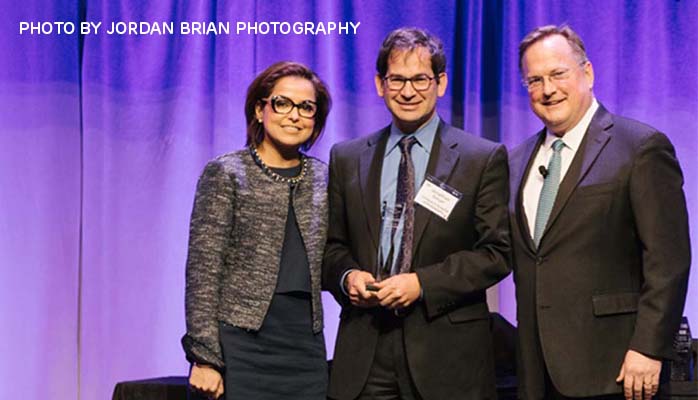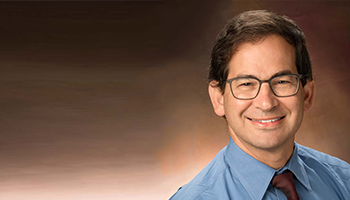HOW CAN WE HELP YOU? Call 1-800-TRY-CHOP
In This Section
Life Sciences PA Award Recognizes Food Allergy Frontier Program’s Patient Impact
A new award honors the remarkable ways in which the Food Allergy Frontier Program at Children’s Hospital of Philadelphia is changing outcomes for patients and families. This week, Life Sciences Pennsylvania recognized Jonathan Spergel, MD, PhD, and his team with a Patient Impact Award for their work in eosinophilic esophagitis (EoE) research and treatment. The organization, which fosters the growth and success of life sciences in Pennsylvania, presented Dr. Spergel with the award at their 2019 Annual Dinner March 14 at the Pennsylvania Convention Center.
“It is a great honor to receive the PA Life Sciences Patient Impact Award,” said Dr. Spergel, who is chief of the Division of Allergy at CHOP and professor of Pediatrics at the University of Pennsylvania. “As a physician-scientist, the goal is to make patients’ lives better and healthier. This award is a recognition of this fact. The award goes to the entire team of clinicians, researchers, physicians, nurses, coordinators, and support staff. For without them, this work would not be possible.”
 To the left of Dr. Spergel is Christopher P. Molineaux, President and CEO of Life Sciences Pennsylvania. To the right is Dr. Reetika Kumar, VP of Clinical Services, AmeriHealth Administrators.
To the left of Dr. Spergel is Christopher P. Molineaux, President and CEO of Life Sciences Pennsylvania. To the right is Dr. Reetika Kumar, VP of Clinical Services, AmeriHealth Administrators.
Life Sciences Pennsylvania grants the Patient Impact Award to a “medicine, therapy, device, or organization that has made a significant contribution to the quality of healthcare or length of life of patients in 2018,” according to the group’s website, A committee of representatives from the Pennsylvania healthcare and academic research community selected honorees for the award, which is sponsored by Independence Blue Cross.
Dr. Spergel and his team work tirelessly to better understand EoE, a rare inflammatory disease of the esophagus, so that they can improve the lives of children with the allergic condition. In EoE, certain food allergens trigger a host of adverse reactions — including vomiting, heartburn sensations, and failure to thrive — that affect multiple areas of a child’s life. But unlike classic food allergies, eliminating the suspected allergen from a patient’s diet is difficult, since individuals with EoE can be sensitive to a number of foods, and clinicians cannot currently predict which foods trigger a reaction.
Dr. Spergel’s work with families at the Food Allergy Center at CHOP has yielded both questions and answers that help to unravel EoE’s mysteries.
In our 2018 Annual Report, we featured some of this work through the eyes of the Harris family, who arrived at CHOP following a frustrating diagnostic odyssey: After years in and out of hospitals for growth problems, compromised immune systems, and other conditions, brothers Dean and Cole Harris both received a diagnosis of EoE. By the time they began a series of food trials at CHOP, the allergic disease had taken a heavy toll on their school, social lives, and general well-being.
But after enrolling in a clinical trial that required a series of biopsies, Dr. Spergel discovered that after 13 years, Dean had outgrown his EoE. Months later, he discovered Cole had, as well.
This discovery, which extended to a subset of other pediatric patients who had outgrown their EoE, showed that EoE was not a lifelong condition, contrary to existing knowledge. And, with more research, researchers might very well develop effective treatments.
Continued research into EoE will no doubt yield even more surprises and scientific breakthroughs. And as the Food Allergy Frontier Program moves forward into its development of novel ways to monitor and manage the disease, it’s impact on the lives of children will grow — with the help of patients, for patients.
“It changed our lives,” said Suzanne Harris, mother of Dean and Cole, in our Annual Report. “Dean was the kid with braces on his leg, but when he graduated eighth grade, he was on the wrestling team, the cross-country team, and he was the class president who gave the commencement address. That was not his fate. So, my wish is that clinicians learn more about that differentiating factor in children who get well — knowing those differences has to bring hope to people.”
 By
By